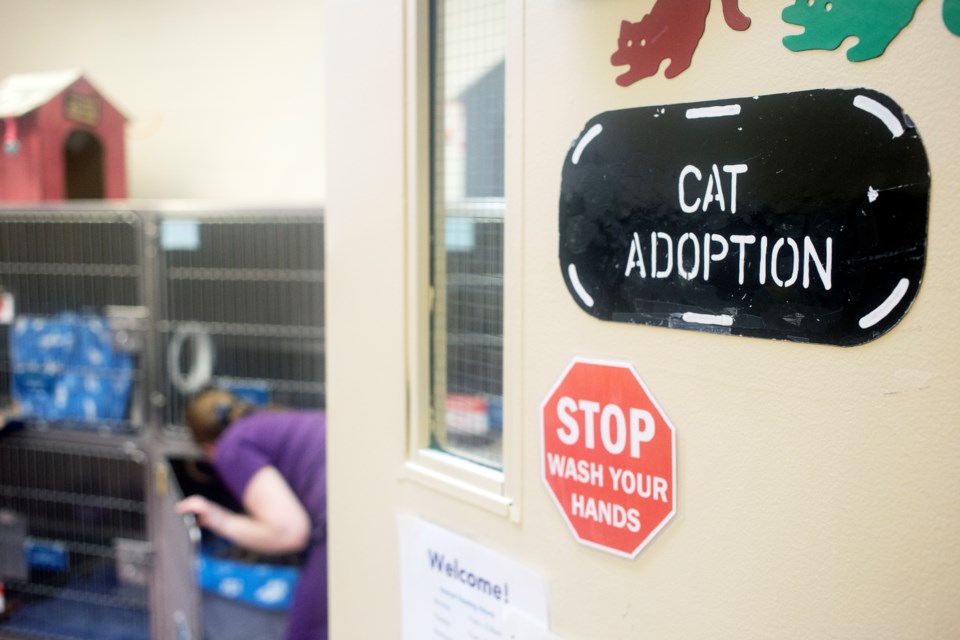Earlier this month a permanent home was found for Doris, the last of the 105 cats the Guelph Humane Society pulled from a single residence at the beginning of the year.
The phenomenon of ‘pandemic pets,’ where people who don’t usually own a pet is compelled during the pandemic to bring one home, also helped to rehome the cats.
Doris spent 255 days in the agency’s care, said Adrienne McBride, executive director of Guelph Humane Society.
“She spent a long time in foster learning to trust people and adjusting to a more normal lifestyle,” said McBride of Doris. “Her foster parents were extremely dedicated to her well-being and ensuring she had every opportunity to flourish.”
When Doris arrived she was caring for a kitten, the youngest of the 105 cats pulled from the home on Huron Street in the Ward.
None of the cats were pregnant, said McBride.
If there was a silver lining to the pandemic, said McBride, it is the extra time the animals in the agency’s care had with foster families, including many of the 105 cats.
“Many of them spent much of their time in foster care getting the socialization and acclimatization to quote-unquote 'normal home life,'” said McBride. “From January until March and they were able to put more time and effort into the socializing and interacting with those cats that had a bit of a struggle adjusting to life outside their previous home.”
About 30 cats were sent to Hamilton-Burlington SPCA and London Humane Society. McBride said none of the 105 cats were euthanized.
McBride said the Humane Society is experiencing an overwhelming number of applications for people to bring home pets, especially kittens and puppies.
“At other times when there hasn’t been a pandemic we are often in the opposite position where we have a number of animals that we would like to place into homes but we don’t have enough homes looking for pets,” said McBride. “It’s interesting that the pandemic has created this supply and demand issue that we haven’t faced before.
As of Friday morning the Humane Society has about 140 animals in its care, with all but 20 currently in foster care on behalf of the agency. McBride said looking at the averages there has not been a reduction of the number of pets coming into the Humane Society’s care.
“At the beginning of COVID we were a bit more cautious with intake, just knowing they could be coming from homes that have COVID and it was unclear science on animals’ ability to transfer the disease to individuals,” said McBride. “Now, our intake is back up to full swing and we are seeing a very steady intake of dogs for a variety of reasons.”
Although there are currently 19 dogs in the agency’s care, most people contacting the Humane Society about adoption are looking for a puppy.
“When we have people interested in puppies we don’t necessarily have them available for adoption at that time and when we do it’s often one puppy coming in and we have 50 applications for one puppy,” said McBride.
“We have definitely seen more homes interested in bringing a pet into their lives and for the reasons we are all experiencing — we are home more, we are working from home, we are not having robust social lives because of the restrictions — that has created an opportunity for them to welcome a pet into their home because they have the time to dedicate to them,” she said. “People inherently know what a pet adds to their home life, especially when only one or two people live in the home and they have a relatively quiet home.”
Because of the shortage at the Humane Society and other rescue organizations, many people are turning to breeders to get a puppy, said McBride.
In the past, the agency would not necessarily recommend people to get their puppies from a breeder, but it has shifted gears to helping people to find a reputable one.
“What we have been focussing our messaging around is education,” said McBride.
The Humane Society is also working to ensure people seeking to adopt or buy a pet that they understand the commitment involved.
“A puppy is a big time commitment in terms of house training and obedience training and things like that. People now know they have the time where they will be sitting at home able to offer that support to the puppy, which they might not have otherwise been able to do,” said McBride.
That could change if life goes back to a more normal state and people return to work full time or are able to travel once again, she said.
“There has been a lot of research and thought around what is going to happen a year from now or whenever we discover a vaccine and can return to normal life and people can return to offices and social lives become full again — what is going to happen to these pets who have become very accustomed to being at home with their owner who has lots of time to dedicate to them,” said McBride.
The Humane Society wants to ensure that people are doing all of the right things to make sure they are raising a good pet.
“We are making sure as an organization that advocates for animals that we are having that conversation with people, even if we are not able to adopt a pet to them because we don’t have one available, we are giving them as much information and coaching around selecting the right pet for them,” she said. “It’s just making sure that you’re making the decision based on your long-term circumstances, not your present circumstance.”
